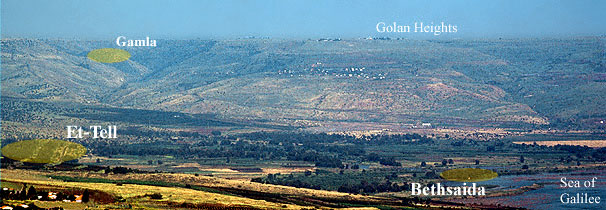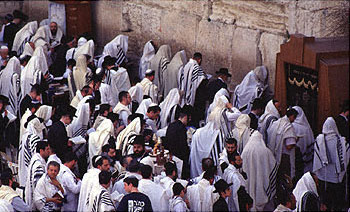The Tithe and Other Taxes
God’s Plan for Provision
by Jeffrey J. Harrison
Five of Jesus’ disciples were from the fishing village of Bethsaida at the northeast corner of the Sea of Galilee.* The name of the village (בית צידה Bet Tsay-DAH), means house (or place) of provision.
This likely refers to the abundant resources of fish in the lake and wild game in the high, grassy cliffs and slopes near the village.** Even today it’s not unusual to see boar, gazelle, and rock badgers in the area. Other wildlife, like porcupines, jackals, and foxes can also be found.

* Peter (Kaipha), Andrew, and Philip were certainly from Bethsaida, and most likely James (Ya‘akov) and John (Yokhanan), too (John 1:44, Luke 5:10). The exact site of Bethsaida has long been disputed. Excavations at et-Tell, about a mile (1.5 km) from the Sea of Galilee, have been broadly accepted as the site of the village. But this doesn’t match the historical descriptions of Bethsaida being right at the edge of the lake. The site known as el-Araj (labeled Bethsaida
in the photo above), is a better match, and is strongly supported by recent archeological discoveries.
** These grassy cliffs and slopes (in the background of the photo above) rise sharply 1800 feet (540 m) to the Golan Heights above.
In the time of Jesus, much of Galilee, as well as the area around Bethsaida (known as Gaulanitis, or today as the Golan), was awash with zealot sympathies. The zealot movement sought to rid the land of its Roman masters at the point of a sword. These sympathies account, in part, for the area’s interest in Jesus as a Messianic king, someone they hoped would lead the war against Rome (John 6:14-15).* The home base of the zealots was not far from Bethsaida, clearly visible in one of the canyons above the village, on a high, rounded hill. On closer approach, this hill assumes the appearance of the back of a camel, complete with a hump, giving rise to its ancient name, Gamla (Camel
; see photos above and below).

* After the miraculous feeding of the five thousand, which was near Bethsaida (Luke 9:10), John says the people were planning to make Jesus king—by force! (John 6:15). This contradicts the popular teaching that the Jewish people rejected Jesus as their Messianic king. In fact, it was he who rejected their understanding of who the Messiah was and what he would do. Instead, he escaped up into the mountains, in the direction of the Golan Heights above.
One of the complaints against Rome that fueled the zealot cause was the high level of taxation. This included a land tax* as well as an income tax and a head tax (or poll tax). These taxes, all part of the tribute
claimed by Rome, are what prompted the famous question to Jesus, Should we pay tribute to Caesar or not?
(Matt. 22:17).** But there were also many others taxes imposed by Rome: customs duties, tolls on roads and bridges, harbor dues, taxes on animals and vehicles, taxes on boats, a salt tax, a sales tax, taxes to enter certain cities or to cross certain bridges, license fees, and even a tax on parcels and letters. There were also local community taxes for the synagogue, the local elementary school, and the public baths. The list goes on and on.
* The land tax (the tributum soli) included a 10% tax on grain and a 20% tax on wine and fruit (Edersheim, Life and Times of Jesus, 1.3.17, p. 516).
** Paying a tribute was considered an act of submission, signaling acceptance of a ruler’s legitimacy. But most Jewish residents felt that Rome had no right to rule the land; and that the Roman conquest of Judea and other Jewish areas was in violation of a treaty Rome had signed with the Jewish people many years earlier, promising friendship and mutual defense (in the time of Judas Maccabeus, 161 BC; 1 Maccabees 8:17-20; Josephus, Antiquities 13.9.2 §§ 259-266). To accept Caesar as lord over their nation was seen by many, including the zealots, to be a denial of God as their true Lord and King, just as some Christian zealots today reject modern governments. But Jesus’ answer recognized Caesar’s right to tax without conceding any of the worship due to God alone: Give to Caesar what belongs to Caesar, and to God what belongs to God
(Matt. 22:21). Since the money used for the tax had Caesar’s picture on it, which meant it was issued by Rome, paying the tax only meant giving back to Caesar what was already his, nothing more (Matt. 22:20). In the same way, Paul counseled Christians to pay the tribute and other taxes (Rom. 13:6-7).
These taxes were especially bothersome because the Jewish people also had to pay all the Jewish religious taxes listed in the Bible—in effect doubling the amount of tax owed by each person. But while the religious taxes might be paid cheerfully, as a service to God, the Roman taxes were paid to pagans, idolaters, and sinners.
Most familiar among the Jewish religious taxes is the tithe (10%), given originally to the Levites, to support those engaged in ministry to God.* This is the tithe on which the idea of Christian tithing is usually based. But this was only one of many additional religious taxes. The largest of these was an additional tithe (the Second Tithe
) that was given to the poor in the third and sixth years out of every seven (in the seven year sabbatical cycle; Deut. 14:28-29). In other years, it was used to cover your expenses during the annual pilgrim festivals (Deut. 14:22-26).** This must be one of the most unique taxes ever imposed on mankind: a tax spent on your own food and drink while celebrating in the presence of God! (Deut. 14:23)
* Levites ministered in song, played musical instruments, provided religious instruction, and served as watchmen, in addition to dozens of other minor jobs they had in the maintenance and upkeep of the Temple. Originally, the Levites in turn paid a tithe to the priests (the tithe of the tithe; Num. 18:26-29). But by the time of Jesus, few Levites were engaged in religious service, so much of the tithe was given directly to the priests.
** Passover (Pesach), Pentecost (Shavuoth), and Tabernacles (Sukkot). While many critical scholars claim that the Second Tithe is a modified version of the First Tithe that was introduced under different historical circumstances, the uniform belief in Judaism, now as in Jesus’ day, is that this is a distinct and separate religious tax.

Joining the annual pilgrim festivals must have been an awesome experience, walking with hundreds of thousands of pilgrims on their way up to Jerusalem. One ancient historian says that as many as four million people came up to the feasts. Children would watch with wide-eyed wonder at the mysterious and elaborate rites in the Temple: from the sobering slaughter of the sacrifices to the sublime worship at the offering of the incense. The blessing of the priests, the songs, and the blasting of the trumpets, all served to elevate life above the ordinary and bring them closer to the God who had commanded these things.
The meals that followed, on which the Second Tithe was spent, were likewise a communal experience. All were invited, including the poor and the Levites (Deut. 14:27). This meant that everyone shared equally in the rejoicing. What a beautiful experience this must have been! A week-long religious holiday (in the case of Passover and Tabernacles) where there was nothing else to do but worship the Lord and enjoy the fellowship, with every need provided for. No wonder the feasts were a time of Messianic expectation! The overflowing abundance of brotherly love, the sense of equality before God, these were a beautiful foreshadowing of the days of the Messiah, when every need will be met and all will live together in peace.*
* This generous character can also be seen in other Jewish religious taxes, such as the setting aside of the corners of the field and the gleanings for the poor (Lev. 19:9-10; see Ruth 2). The amount of this particular tax, set at a minimum of 2% by the rabbis, is not specified in the Bible. But the intention of the law is clear: to share generously with those less fortunate than ourselves.
At one such festival (Shavuoth, the Feast of Pentecost), fifty days after the resurrection of Jesus, his followers in Jerusalem were filled with the Holy Spirit and began to exercise spiritual gifts, a foretaste of the coming Messianic age. How did they respond to these miraculous events and the conviction it brought that Jesus had begun to reign (Acts 2:33)? They sold their belongings and gave the proceeds to the poor among them: all things were common property to them
and there was not a needy person among them
(Acts 4:32,34). They had understood the message taught not only in the Biblical feasts, but in the entire system of giving in the Bible: that blessings shared with others are multiplied and yield more than enough for all!
Unfortunately, the Prosperity Gospel
so popular today leads many to despise the poor and blame them for their need (because they lack faith
). But the Biblical path to prosperity is to share with the poor. He who gives to the poor will never want
(Pro. 28:27, also Pro. 22:9, 22:16, etc.). The Pharisees were criticized by Jesus for many things, but never for a lack of generosity. Have modern Christians strayed so far from the Messianic ideal of brotherhood and unity in the kingdom of God? Where is mercy? Where is compassion?*
* It’s true that the poor need jobs, not just a hand out. But God’s love is not just for the most talented, the most educated, and the most successful. It’s also for the most unfortunate, the most uneducated, and the least successful. Our responsibility to be generous is to all who are made in the image of God (Matt. 5:42).
When you add them all together, the religious taxes owed by the Jewish people for the Temple, the priests, the Levites, rejoicing at the feasts, and for the poor totaled more than 25% of their income. This means that the debate among Christians about whether or not to give a tithe (10%) ignores much of the Biblical evidence. If we’re really going to base our giving on the Hebrew Bible (the Old Testament), we should talk about giving 25% and more.*
* Jesus said our righteousness should be abundantly greater than the scribes and Pharisees, who were very diligent about their giving (Matt. 5:20). The word righteousness
(צדקה tzedakah) he uses here often had the meaning, gifts to the poor,
as it still does in the Jewish community today (see Matt. 6:1-4).
But in fact, Jesus didn’t ask for 10% or even 25%, but rather for 100%! Any of you that does not give up all his possessions cannot be my disciple
(Luke 14:33 also 12:33, 18:22; Mark 12:30). That’s quite a tax bracket! He wants everything we are and everything we have.
Were it not for the example of the First Covenant (the Old Testament), this would appear a complete impossibility. But the evidence of history is that the more faithfully God’s people obey the principles of giving in God’s Word, the greater their abundance. Jesus simply took this to its logical conclusion: that complete generosity—giving all for God—leads to an even greater overflowing of abundance. There is no one who has left house or brothers or sisters or mother or father or children or lands, because of me and because of the gospel, but that he will receive a hundred times as much now in this present time, houses and brothers and sisters and mothers and children and lands, and in the coming age eternal life
(Mark 10:29-30). Jesus came to confirm and extend God’s promise of provision for those who are generous and merciful.
The kingdom of God Jesus preached is a place of provision, where there is enough for everyone. Don’t be anxious then, saying,
(Matt. 6:31). Our hearts can be at peace about the future, so we can confidently share God’s love and his blessings with others. If we each do our part, if we pursue our calling with diligence and share the fruit with others, the needs of all will be met (Eph. 4:28).What will we eat?
or What will we drink?
But if we reject Jesus’ vision of the kingdom, cursing the poor that he has blessed (Blessed are the poor
; Luke 6:20), we are left with a message of sanctified selfishness. This is a rejection of the very heart of Jesus’ teaching, and cuts us off from the joy he wants us to experience right now in the body of Messiah—a joy that comes from sharing with others. Working in this way you must help the weak; and remember the words of the Lord Jesus, that he himself said,
(Acts 20:35).To give is more blessed than to receive
The disciples understood God’s vision of the kingdom on that feast of Pentecost, when not only did they pray and see miracles, but they also began to help each other in practical ways. No wonder abundant grace was on them all
(Acts 4:33). Their generosity toward each other is evidence their lives had been changed by the power of God, and that they had begun living in the kingdom. Isn’t that what Jesus meant when he said, Seek first the kingdom
(Matt. 6:33)? Not our own selfish desires, but the good of the kingdom and those who are in it must be our top priority. When it is, the promise that follows comes into effect: And all these things will be added to you
(Matt. 6:33).